 |
| Valeria Bruni Tedeschi as Gianna with Valeria Golino as Pupa in Ginevra Elkann’s Open Roads: New Italian Cinema highlight I Told You So (Te l’Avevo Detto) |
Ginevra Elkann’s I Told You So (Te l’Avevo Detto), starring Valeria Bruni Tedeschi, Valeria Golino, Alba Rohrwacher, Riccardo Scamarcio, Greta Scacchi, and Danny Huston was a highlight of the 23rd edition of Cinecittà and Film at Lincoln Center’s Open Roads: New Italian Cinema in New York. The first time I spoke with Ginevra Elkann was at the Istituto Luce Cinecittà opening night reception for The Wonders: Alice and Alba Rohrwacher at the Museum of Modern Art in New York in 2019. It was for her début feature Magari (If Only, co-written with Chiara Barzini), also shot by Vladan Radovic (Marco Bellocchio’s The Traitor, Gianni Zanasi’s Lucia's Grace, Laura Bispuri’s Daughter Of Mine).
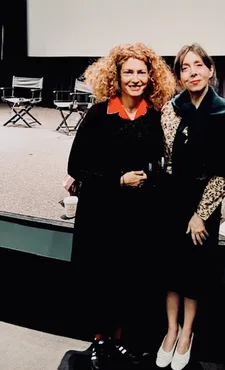 |
| Ginevra Elkann with Anne-Katrin Titze on Valeria Bruni Tedeschi: “She’s an incredible actress and very funny” |
On the morning of the Italian Cultural Institute New York and Cinecittà luncheon at The Leopard at des Artistes, Ginevra Elkann discussed with me how the heat in Rome was the starting point of her new film, addictions to a lifestyle, casting the illustrious roles, how the two Valerias got their parts, a familiar parrot and a dog filling in for a lamb, ashes down the drain, and how Biblical references sneak in when speaking of the apocalypse.
It is January in Rome, the weather forecast announces an unexpected heatwave with temperatures of 39 Celsius, more than 102 Fahrenheit for the afternoon. While the earth is heating up and human destructiveness is at a point of no return, a number of inhabitants in the city seem at first to be too preoccupied with their personal addictions to notice.
There is Gianna (Bruni Tedeschi), obsessed with God and her old friend Pupa (Golino), who became an adult film actress and addicted to Botox. Gianna’s daughter is bulimic and works for an old lady (Bruni’s real-life mother Marisa Borini) who is glued to the television. Rohrwacher is Caterina, an alcoholic, who tries to spend time with her son on his birthday, while her ex-husband Riccardo (Scamarcio) does not consider this to be a good idea.
We also encounter an unconventional priest named Bill (Huston), a drug addict, who takes Gianna’s confession and awaits his sister Frances (Greta Scacchi) to arrive from America with their mother’s ashes. The church’s WIFI password is hallelujah 789. The ochre-tinted light makes this January feel like a scorching July. We are not watching pilgrims, but the various strands of the narrative do conjure up something ancient hiding in the modern world until a small orange ball to the tune of La Bamba disappears into space.
From inside Film at Lincoln Center’s Walter Reade Theater, Ginevra Elkann joined me for an in-depth conversation on I Told You So.
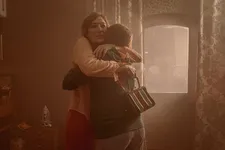 |
| Ginevra Elkann on Valeria Bruni Tedeschi as Gianna: “She’s really perfect for this role.” |
Anne-Katrin Titze: Good to see you again! We spoke at MoMA when you were presenting Magari with Alba and Alice Rohrwacher there.
Ginevra Elkann: Yes!
AKT: If I remember correctly, in your previous film there is also a kind of temperature switch up. The characters in Magari pack up winter clothing for the mountains and then end up going to the beach?
GE: It’s true! I never thought of that!
AKT: In I told You So, it is January with extremely hot temperatures.
GE: It’s interesting I never thought of that. Clearly I like to be out of season!
AKT: Out of season and in the wrong clothes! There is a lot going on in your film. There are a lot of characters and they have a lot of things that they are addicted to, that they are concerned with, which are self-destructive. And at the same time the world is falling to pieces. Was the latter the starting point?
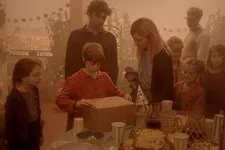 |
| Riccardo Scamarcio and Alba Rohrwacher as parents, celebrating their son’s January birthday in the scorching heat |
GE: Yes, the starting point was the heat really. And this idea of the growing heat and what’s going to happen to the world and where we are going. You know, it stems from my own anxiety. Finding myself in these huge amounts of heat in Rome. In the summer even there’s something really strange about that. Then I thought, what if we put in characters who are all addicts, really, who are escaping their pain and their trauma by using. As we were making and writing this film, I thought, actually there is a parallel between that. Basically we are all addicts of our lifestyle and we consume on a constant basis. We know the world is going the way it’s going but we can’t stop. We’re like an alcoholic who knows that alcohol is bad for them, but they’re just going to drink.
AKT: And that comes with the lies! Lies to themselves. Alba is quite fantastic in that respect in the film. Several times, without any hesitation her character says, oh I quit drinking, while we see her …
GE: …. with a drink! That’s addiction. Addicts are liars.
AKT: How did the casting for the various roles and their addictions come about? Did some of the actors have a choice? The two Valerias are fantastic! They are always great together. Did you pick who is going to be who?
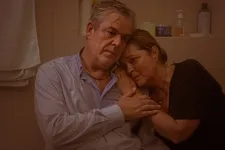 |
| Bill (Danny Huston) and Frances (Greta Scacchi) making a decision about their mother’s ashes |
GE: No! I actually said to Valeria Golino that she was going to be Gianna, the character of Valeria Bruni. And she said, you know, I know someone who speaks to God much better than I do!
AKT: Ha!
GE: It was Valeria Bruni and then she said, but maybe I could be Pupa. You know, she hesitated, it’s a complex character. But then I convinced her she would make a wonderful Pupa and she did. She enjoyed it a lot.
AKT: My favourite line in the movie is when Pupa explains the scratch on her face: “This morning, a parrot I know attacked me!” The fact that she distinguishes it from a bird she doesn’t know! It’s a friend of hers!
GE: I love that line, too. She’s so good, Pupa. I am definitely totally mad for her. I love her personality, just so loving and free.
AKT: Her costumes are wild! And the eye shadow reminded me of Endora in Bewitched, Agnes Moorehead. Did you ever watch the show from the Sixties and Seventies?
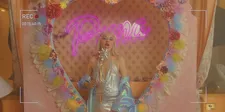 |
| Pupa (Valeria Golino) explains the scratch on her face: “This morning, a parrot I know attacked me!” |
GE: Yes, I know her exactly!
AKT: There are a lot of absurd moments. Valeria Bruni, with curlers in her hair, alone in the kitchen, when she burps, and says, excuse me! To herself!
GE: No, to God!
AKT: Oh, I see, to God! She is such a fantastic slapstick actress.
GE: She is for sure.
AKT: One of the best with physical comedy!
GE: Her intensity, yeah, she’s an incredible actress and very funny. The character was written funny, this character who speaks to God and gets angry, even when she goes for confession. That scene I love. And she’s really Gianna. I mean she’s really perfect for this role. Also I like a lot about these two characters their relationship to sexuality. Because one is a porn star, so she represents sex, and the other one is a God bigot, but the bigot is much more sexual than the porn star. The porn star is actually almost asexual. She’s not interested in sex at all, whereas the other one is obsessed by sex in some kind of way. This film always wants to do that in some ways - people are not how you define them.
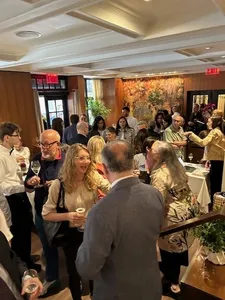 |
| The Italian Cultural Institute New York and Cinecittà luncheon at The Leopard at des Artistes Photo: Anne Katrin Titze |
AKT: That goes for the priest as well, Danny Huston, whom I have never seen like that before!
GE: He is amazing and is a fantastic actor. His Italian is outstanding!
AKT: Yes, I noticed! You have Valeria Bruni’s mother [Marisa Borini] in the cast as well!
GE: Yeah.
AKT: Watching television is her addiction. Did Valeria ask if she can bring mom?
GE: Exactly! She said, oh if you’re looking for someone to do the old lady you should ask my mom! I said, yeah, that’s a fantastic idea.
AKT: She’s great. I only know her from Valeria’s own films. The daughter’s eating disorder is perfectly explained by the behaviour of the mother, Gianna, and how she treats her.
GE: Yes, the triggering, what triggers this kind of behaviour.
AKT: Alba’s character has the alcohol addiction. My favourite scenes with her are when she carries the dog casually over her shoulders as if it were a fox stole.
GE: It’s Christic. You know how you have Christ with the lamb?
AKT: Oh, yes, of course! Now I see it! I did not put that together! That’s what you had in mind?
GE: When I saw it. I think the film has a lot of biblical … You know, when you speak about the end of the world or the apocalypse. For me when I was a kid - and I grew up in a very religious family - I’m not religious myself today, but all that imaginary that I heard as a kid stayed with me. So to some degree in these stories you have the end of the world because people are sinners and then God gets angry and the end of the world arrives in most stories of the Bible. And I feel like addiction is a re-explanation of sin. It’s the same thing, only that we don’t judge it anymore. It’s not a moral judgement. There’s a feeling of unhappiness or there’s something that we know psychologically why people become addicts and how it works. But in reality it’s just a different way of telling a story. So Pupa is like Mary Magdalene, or like a martyr almost. That she dies like this. So I think I had that in mind in my head.
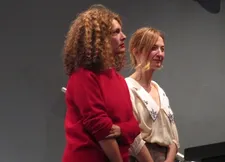 |
| Ginevra Elkann with Alba Rohrwacher at the Museum of Modern Art première of Magari (If Only) Photo: Anne Katrin Titze |
AKT: Especially with the ending! Ashes to ashes - Greta Scacchi and Danny Huston with the ashes in the toilet, that’s a shocking scene! With everything else going on, I still was a little bit shocked by that act.
GE: It was in the air. I actually love that scene. It’s my favourite scene of the film because they are wonderful the two of them. They are like two children.
AKT: Bonding!
GE: Bonding, and they do something in an act of craziness. In fact, they are like oh, shit, what did we just do?
AKT: It’s what they had never done before, to distance themselves, and it’s necessary. Thank you for this!
GE: Thank you!
The 23rd edition of Open Roads: New Italian Cinema took place from May 30 through June 6.





















